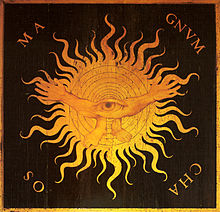Chaos (mythology)
In some Greek cosmogonic accounts and equally present in other cultures, Chaos is that which exists before the rest of the gods and elemental forces, that is, the pristine state of the cosmos. The term comes from the ancient Greek Χάος, 'opening space', or 'cleft', and comes from the verb χάω, which in derived forms means 'yawn', 'open a wound' or 'open a cave'. In the V century a. C. it was identified with the air, space or void in which the rest of existence is framed. Only later did it acquire the meaning of "elementary confusion" with Ovid (Metamorphoses I, 7: "rudis indigestaque moles").
Hesiod's Theogony
According to Hesiod's Theogony, Chaos was the first thing that existed, and then he lists other elemental cosmogonic figures such as Gaea (Earth) and Tartarus. Considering these elemental deities as children of Chaos is a contentious point, since Hesiod never explicitly says that they were generated by him. However, many experts take it for granted when they consider that, since Chaos was the only originally existing entity, later deities must necessarily have arisen from it. Nix (Night) and Erebus are explicitly referred to as children of Chaos (v. 124), with Ether and Hemera (Day) being their grandchildren (v. 125-6).
An important philological tradition considers that Chaos is the cleft or loophole located between heaven and earth. Hesiod recounts in the Titanomachy that Zeus, by throwing lightning at the Titans, makes Chaos tremble (v. 700), and compares this fact with the rapprochement between Uranus (Heaven) and Gaia (Earth). This passage, added to the semantic value of the word Χάος, makes Francis Macdonald Cornford's interpretation admissible, according to which the words of verse 116 (Χάος γένετ᾽) should be translated as 'the crack arose between the earth and heaven'. Geoffrey Stephen Kirk and John Earle Raven reinforce this interpretation, and although they take into account the difficulty that Uranus in the source derives from Gaia at a later stage of cosmogony, they think that what Hesiod meant It is that at the beginning there was a formless whole, that heaven and earth formed an undifferentiated mass and in the narrated beginning they separated: the first thing is this separation, which is later reduplicated figuratively in the birth of Uranus from Gaea and mythopoeically in the account of the castration of Urano by Cronus (v.154ff).
A variant of this interpretation is given by Olof Gigon. He indicates that Hesiod starts from the image of the cosmos as a cavity formed by the vault, the sky and the earth as the ground, and then mentally suppresses both to arrive at a concept such as Chaos. It is something completely indeterminate, which is indicated by the fact that the word to designate it is grammatically neutral. This brings him closer to the ἄπειρον (ápeiron, 'the indeterminate') of Anaximander. For Gigon, under the face of such a cosmogonic divinity hides the philosophical concept of a principle prior to everything.
Later theogonies
The Orphic tradition in its fragments presents a primordial Egg, equated with Hesiod's Chaos. This Egg is not the first to emerge, but rather it comes from Chronos (Orphicorum fragmenta, 54-57).
Another important variant is presented by Cayo Julio Higino in his Fables. In the prologue of said work he presents a cosmogony, where he puts Chaos as a descendant of Darkness. Chaos and Darkness then conceive Night, Day, Erebus and Ether.
In his work The Metamorphoses, Ovid described Chaos as rudis indigestaque moles, “a rather crude and indigestible mass, a lifeless, shapeless and edgeless lump, of discordant seeds and rightly called Chaos", a description that departs from the most ancient meaning of the mythical element ('loop' or 'hollow'), but which has determined the orientation of the interpretations in use since then, until reaching the current family conception of 'complete disorder'.
Contenido relacionado
Gorgon
Dionysus
Stygian

